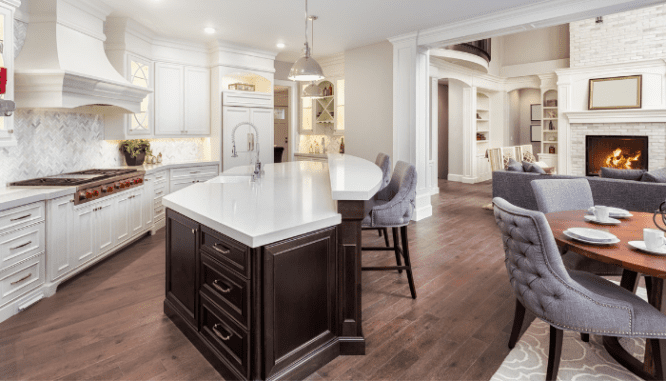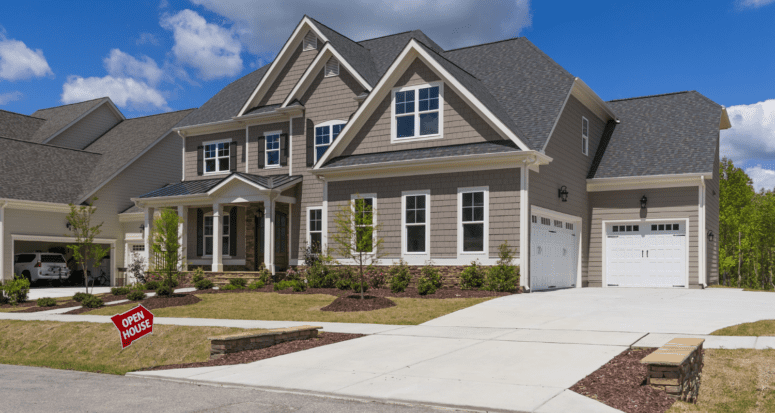Open Up at an Open House: How To Answer Brokers’ Questions Without Giving Too Much Away
- Published on
- 6 min read
-
 Melissa Holtje Contributing AuthorClose
Melissa Holtje Contributing AuthorClose Melissa Holtje Contributing Author
Melissa Holtje Contributing AuthorMelissa enjoys using her experience as a house flipper, investment buyer, and waterfront home owner to help buyers and sellers thrive in the housing market. When not scouting real estate, you’ll most likely find her at the beach.
Open houses are meant to create a casual environment for potential buyers to view a home that’s on the market. For many homebuyers, an open house is a great way to see what a particular neighborhood has to offer, “try on” a different home layout, or determine how far their budget might go. But real estate brokers also ask a lot of questions, and if you’re a first-time buyer, you might not know how to answer a broker’s questions at an open house.
That’s why some home shoppers shy away from open houses, worried that they might have to endure hard-sell pressure from the listing agent. How is a homebuyer supposed to know what the right answer is? Could certain answers hurt negotiation chances later?
Dianna Caldwell, an accredited buyer’s representative in Hebron, Kentucky, tells open house attendees that they have nothing to fear from brokers’ questions.
“We keep it all conversational. It’s not an inquisition. We just can’t help someone if we don’t know what their situation is!”
If you’re preparing to go to an open house, rest assured that agents aren’t really looking for right or wrong answers to their questions — just honest ones.
That said, a savvy approach to how you communicate with listing agents can make all the difference in your overall home search. We’ll guide you through how to answer brokers’ questions at an open house, using some typical broker questions to help you feel confident as you attend your next open house.

Are you in the market to buy, or are you just here to look?
What the broker really wants to know
Some open house-goers may think this is a loaded question — as in, they think the agent is passively asking them to leave unless they’re serious about a purchase. Or they think they’ll have to answer a ton more questions if they say they’re actively looking.
In reality, the agent is merely curious about what you want to get from the open house.
Did you happen upon the open house and just stop in for fun? Are you a neighbor who’s looking for creative furniture layout ideas in that tricky upstairs bedroom? Or are you someone who’s truly interested in purchasing this home?
The broker has limited time and attention to give to each open house attendee; they’re just trying to use that time wisely.
Caldwell says, “If I have a lot of traffic, I have to determine real quick who to spend my time with, to focus my time on someone I’m truly going to be able to help.”
What you should say
Be honest! Don’t worry about being pressured into a sale.
Brokers know that it takes some time to make a home purchase decision, so they’re not expecting you to sign an offer before you leave or anything. Rather, they’re hoping to answer any questions that you may have about the property — so let them!
An agent will not ask you to leave if you’re “just looking.” A packed open house makes the home seem more desirable, which is in their clients’ best interest.
If you’re not in the market to buy, they may ask follow-up questions about friends or family members who might be house shopping, so answer as you see fit. (Hmmm….maybe it would be nice to have Aunt Sue right around the corner!)
Are you looking at this neighborhood specifically? Where else are you considering buying a house?
What the broker really wants to know
This question helps to gauge your seriousness, as well. If you’ve narrowed down your search area to this specific neighborhood, you’re obviously going to be more cued into what this particular home has to offer compared to other homes.
Also, brokers represent different listings all over town, so they’re curious about your geographic criteria. If this home ends up missing a few key factors on your list, they may suggest a listing in another neighborhood that would suit you better.
What you should say
Letting a broker know about your preferred areas can only help your home search. Tell them why you’d like to stay in this neighborhood, or why you’d consider other neighborhoods. Is it the school zoning? The community amenities? The proximity to work or transportation? Tell them what you’re thinking so that they get a better idea of what’s important to you.

How long have you been looking for a house to buy?
What the broker really wants to know
Time can be telling in the real estate industry, so a broker is asking this question to help determine where you’re at in the process. Rarely will a homebuyer purchase the first house they lay eyes on. It takes time to figure out what you want and what the market has to offer.
On the flip side, Caldwell says she’s also curious about homebuyers who’ve been looking for a long time. In that case, she’d likely ask a follow-up question about specific search criteria, along with what they’ve found lacking in other homes, all in an effort to help with the search.
What you should say
Give the agent a ballpark idea of how long you’ve been looking for a house. Distinguish between time spent casually browsing online and time spent actively going to showings. Taking the step to visit properties indicates a shift in motivation, so they’ll be glad for that information.
Fill them in on any barriers you’ve experienced in your search, too. If you’re looking for four bedrooms in an area saturated by mostly three-bedroom homes, they might be able to point you toward an alternative you hadn’t thought of.
How does this house line up against other homes that you’ve seen?
What the broker really wants to know
The broker has done their research. They know all about comparable homes in the area. What they don’t know is how you perceive this home in light of those comparable homes.
They’re asking this question to tap into your buyer’s eye. What makes this home stand out from the rest — for better or for worse?
Normally, the listing agent keeps a record of open house feedback. Homebuying is a subjective process, but data — like your responses — helps them to bring in a little more objectivity.
For example, if you’re one of many visitors who comment on the lack of landscaping, they can take that common thread to the seller in hopes of making a change.
What you should say
Say what’s on your mind! Sure, the broker works for the seller, but they’re not emotionally invested in this place. You aren’t going to hurt the agent’s feelings if you tell them how this home falls short of others that you’ve seen, and you might help them persuade the sellers to adjust the price or make home repairs.

What are your favorite features of this house?
What the broker really wants to know
This is another question the agent will use when reporting to their clients after the open house. Everyone wants to hear good things about their home!
The agent might also be curious about what appeals to you as a buyer. If this home isn’t “the one,” then knowing what you like can help them suggest homes with similar features.
What you should say
Tell the broker what you like, and also explain why you like it. Okay response: “The office is great.” Better response: “I work from home, and I need a good space with a door that shuts and a couple of big windows to let in light, so the office is my favorite feature.”
However, use some discretion if you’re planning to make an offer on this house. Getting too excited could end up hurting you later in negotiations. You can label a feature as your favorite without telling the agent that it’s perfect or exactly what you need. Once the broker knows you’re “in love,” they’ll start to see dollar signs.
What are your least favorite features?
What the broker really wants to know
Again, this is both a lifestyle question and a feedback question. The agent wants to learn about your needs to see if they can make a match in the current housing market. They also want to pass your response on to the sellers in case they’d like to make updates.
What you should say
This is another good opportunity to give some “why” feedback. Okay answer: “The bedrooms are too small.” Better answer: “I have two preteen boys who are going to need higher ceilings and more space to move around in the bedrooms.”

Are you working with a buyer’s agent?
What the broker really wants to know
Real estate agents don’t want to step on another agent’s toes. If you’re already represented, they shouldn’t offer to work as your agent.
What you should say
Give your agent’s name and brokerage if you are represented. In fact, you can list your agent’s contact information on the sign-in sheet instead of your own.
If you’re not working with a buyer’s agent, just say so. The listing agent may follow up with you, but you’re under no obligation to work with them on this or any other house.
One situation of special consideration: If you are interested in the house and are not working with an agent already, the listing agent may offer to represent you, or they may recommend another agent from their brokerage. This is called dual agency or designated agency, and you’ll want to do your research before agreeing to this arrangement. It means you aren’t going to have someone who’s representing only your interests in a big, expensive transaction. In fact, in some states, dual agency is not legal.
If you’re uncomfortable with dual or designated agency, you may want to consider connecting with a different top-rated HomeLight agent in your area instead.
What do you think of the price?
What the broker really wants to know
They want to know if you think the house is priced competitively or overpriced. Remember, their market research only goes so far. They want to hear your perspective so they can share it with the sellers.
What you should say
This might feel like the most fraught question on the list, and the one you feel least equipped to answer. But there’s good news … when it comes to how to answer brokers’ questions at an open house, there really isn’t a right answer here!
Give them your honest opinion, and back it up with comparisons to other homes you’ve seen. Okay answer: “It’s too high.” Better answer: “This house is priced $10,000 higher than the one two streets over, which has a third bedroom and a bigger yard.”

Are you considering making an offer? Could you see yourself living here? What would it take to get you to submit an offer today?
What the broker really wants to know
They want to know your intentions based on first impressions, and they want to answer any pressing questions you may have about the property.
Again, most brokers realize that an immediate offer is unlikely — but they want to know what to expect, especially in a competitive situation. Bottom line, they need to know whether to advise the sellers to wait on your offer or not.
What you should say
When considering how to answer brokers’ questions at an open house, this one is the most dangerous for you as a buyer. If this is your dream home, you definitely don’t want to start gushing all over the broker about how much you love the place.
Always ask to see any seller’s disclosures and inspection reports before you reply. And if you’ve got a buyer’s agent, you should always respond with “Let me talk to my agent. They’ll get back to you.”
In a multiple-offer scenario, you can let the listing agent know if you do intend to make an offer. Your answer is not set in stone; you’re allowed to change your mind!
At the end of the day, Caldwell says, “An open house is about making people feel comfortable. No one wants to be ‘sold’. The No. 1 goal is to make sure people learn what they can about the home and answer any questions they have about the house.”
If you don’t know how to answer brokers’ questions at an open house, don’t worry. They really are just there to help you out!
Remember, a good listing agent isn’t trying to pressure you by asking any of these questions at an open house. They’re simply trying to do the best job for their clients — and hopefully for you, too!
Header Image Source: (AlexLinck / ShutterStock)
